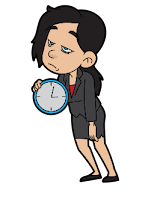I noted is part 3 that decisions are made by groups as well as by individuals. Generally, we throw people into a room together, give them information, and ask them to make a decision...and then wonder why they can't make a decision and do it quickly.
First, groups work well together when they have time to get to know each other. Groups will sometimes engage in warm-up exercises or getting to know you exercises, and that is a start. However, being comfortable with each other and each other's style takes a lot longer than that. That learning about each other happens during meetings, in the hallway, and even over lunch. A group's ability to make decisions is honed as the groups makes small decisions (e.g., where to go for lunch) as well as big ones (e.g., which software to purchase).
Second, groups need to discover what role each person is playing in the group. There are a number of tests (e.g., Myer-Briggs) and other resources to help teams figure this out. What is your natural role on a team? Can you adopt a different role, if necessary, in order to bring a different perspective to the team? Can the team members voice this information to each other and keep it in mind as they work together?
Third, effective teams need to be able to be brutally honest with each other. Notice the "be able" in that sentence. You may not be brutally honest all the time ("I really hate that dress"), but you should be comfortable being brutally honest when it doing so helps the team and the decisions it is making. That ability does not happen overnight.
Fourth, teams need to have to-do lists, keep notes, etc., just like individuals do. They need to make guidelines, policies and procedures, which will cut down on the number of ad hoc decisions that need to be made. (By the way, if you have guidelines for how something is to done, recognize that the guideline outlines decisions that have already been made.)
Teamwork not only means that teams do work, but that it takes work to be a team. It also takes more work to be a team that can make decisions together and can do so with getting fatigued.
I hope this has been a worthwhile series for you to read. I know it has been a worthwhile series for me to write! If you think others would benefit from it, please pass it along.
Resources:
- Dymer, Chuck. "Six Hats to Manage Your Next Meeting." Successful Meetings 53.9 (2004): 30-31. Hospitality & Tourism Complete. EBSCO.
- 10 tips for Working Effectively in Groups
- 8 Teamwork Tips for Working with Unfamiliar Co-Workers
- How to be an Effective Team Member
Note: I'm an Amazon Associate, which means if you click on the Amazon link and make a purchase, I'll get a tiny commission. Tiny.
[Updated 08/25/2023]

1 comment:
Reading the series this afternoon makes me feel less fatigued than I was before I cruised your blog again this afternoon. And building upon what you said, I can't speak highly enough of physical exertion (walking, hiking, biking, ice skating) as outlets that paradoxically reduce fatigue and revitalize us even as they lead us to (other) much-needed periods of rest. Guess you have a new tag line: Jill Hurst-Wahl, Fatigue Buster!
Post a Comment